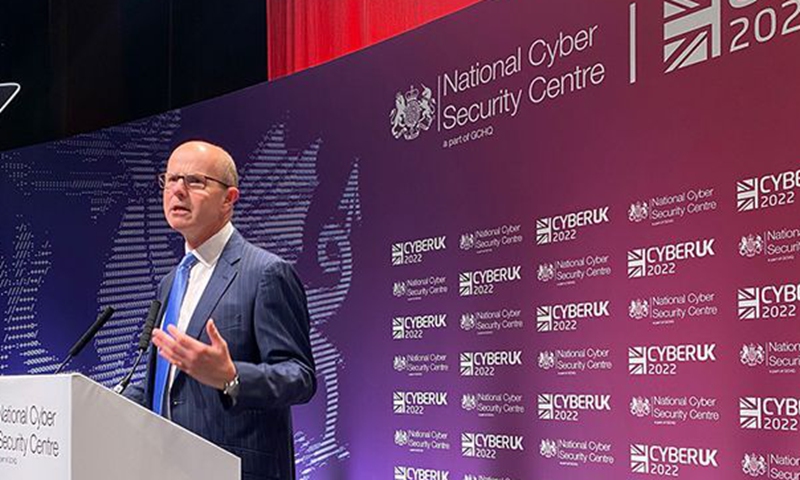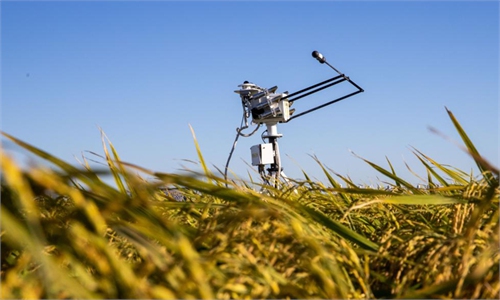UK spy chief’s so-called ‘China tech threat’ a baseless accusation; stoking conflict will backfire: FM

Jeremy Fleming, head of Government Communications Headquarters (GCHQ) File photo: website of GCHQ
China's Foreign Ministry spokesperson on Tuesday rebuked a "baseless" accusation from the UK's top cyber intelligence agency chief who, according to the excerpts of his Tuesday speech, is claiming that China is using its financial and scientific muscle to manipulate technologies in a manner that risks global security.
The accusations by the British official have no factual basis at all, Mao Ning, spokesperson for the Chinese Foreign Ministry, said at a press conference on Tuesday.
"China's technological development is aimed at making lives better for the Chinese people. It does not target anyone, still less pose any threat," Mao stressed.
Subscribing to the so-called "China threat" theory and stoking confrontation benefits no one and will eventually backfire, the spokesperson condemned.
Jeremy Fleming, head of Government Communications Headquarters (GCHQ), the UK's electronic spy agency, warned in a public speech to the Royal United Services Institute think tank on Tuesday that China wants to "gain strategic advantage by shaping the world's technology ecosystem," the Associated Press reported.
He said China is seeking to use digital currencies used by central banks to snoop on users' transactions and as a way of avoiding future international sanctions of the sort imposed on Russia over its operation in Ukraine, according to the report.
The excerpts from the scheduled speech have already been released on Monday.
China will fully respect privacy and protect personal information in using the digital yuan, Mu Changchun, director of the Digital Currency Research Institute of the People's Bank of China said in July, as Beijing encourages greater adoption of e-CNY.
Xiang Ligang, director-general of the Information Consumption Alliance, an industry association, told the Global Times that it is a sovereign nation's right to develop a digital currency, and it makes sense to enhance its financial security through the technology.
Xiang believes that Fleming's remarks represent a "hegemonic thinking." "Why can some Western countries impose unilateral sanctions while other countries cannot take precautions?" Xiang questioned.
Also, Fleming claimed that China's BeiDou satellite system — an alternative to the widely used GPS navigation technology — could contain "a powerful anti-satellite capability, with a doctrine of denying other nations access to space in the event of a conflict."
This is not the first time that the UK' spy chief made accusations targeting China. Reuters reported that last year, he said the West faced a battle to ensure China does not dominate important emerging technologies such as artificial intelligence, synthetic biology and genetics.
Xiang pointed out that the accusations made by some Western politicians and media against China are not based on real evidence. Xiang stressed that China's scientific and technological development has not harmed the interests of other countries, but has helped consumers in countries enjoy better and cheaper services by providing high-quality technologies and products.
Formally designating China as a "threat," if eventually announced by the UK government, is seen by Chinese observers as a clear shift that London is abandoning its pragmatism and bowing to Washington's long-term pressure of being hostile toward Beijing. They also believe it would be a bad move and a "diplomatic failure" for the new Prime Minister Liz Truss, if being anti-China is a tactic to shore up her faltering premiership before the next election, as such a decision will strike a heavy blow to the UK's staggering economy and eventually further impinge on Truss's rule.
China is to be formally designated a "threat" to the UK in a rewrite of former Prime Minister Boris Johnson's defense and foreign policy, the Guardian reported on Tuesday. Under Johnson, China had been categorized as a "systemic competitor" but the UK media said it seems like Truss wants to take a more hawkish stance quickly.
The information has not been confirmed by UK authorities yet, and the Guardian cited one insider who claimed the change could come "within days." Once announced, the re-designation will bring the UK's official position toward China close to its stance on Russia, currently classed as "the most acute threat" facing the UK, the report said.
On Tuesday, Jeremy Fleming, director of GCHQ, Britain's cyber intelligence agency accused China of trying to "rewrite the rules of international security," saying that Beijing is using its economic and technological clout to clamp down at home and exert control abroad.
In response, a spokesperson from the Chinese embassy in the UK said on Wednesday that "remarks made by the head of the British intelligence agency are full of prejudice and totally baseless." China's efforts to develop technology and promote international cooperation in science and technology are aimed at improving the life of the Chinese people and the well-being of humanity, according to the spokesperson.




